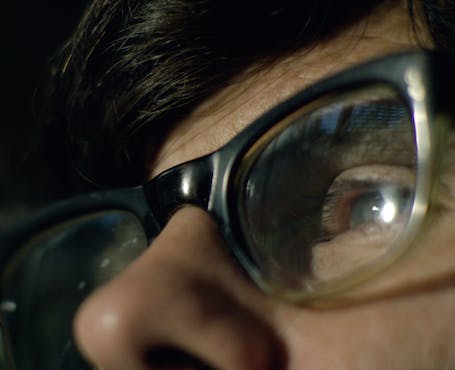Cinema struggles with blindness. How can an inherently visual medium effectively illustrate the loss of vision? It’s a challenge. But one that Notes on Blindness meets beautifully, thanks to both the truly compelling character at its heart and the innovative approach from behind-the-camera.
Professor John Hull is uniquely suited to take the viewer on a journey into darkness; his book Touching the Rock is widely celebrated as the definitive account of blindness. He is sensitive and articulate, unafraid to detail his physical deterioration or plumb the depths of its emotional and psychological toll.
Directors Peter Middleton and James Spinney recognise just how vital Hull’s voice is to the story, and have created a film that puts it front and centre. Through the decades of audio diaries and in-depth interviews, Hull and his wife Marilyn’s voices have been perfectly preserved – along with those of several supporting characters.
Actors in the film lip-sync to their words and re-enact their experiences, resulting in a distinct docu-drama hybrid. Dan Skinner captures the professor’s gentle and profound energy, while Simone Kirby portrays Marilyn as a rare bright light in a darkening world.
This was the second time Middleton and Spinney had worked with Hull, having previously collaborated on a short documentary in 2010. Inspired by his ‘discovery of a world beyond sight,’ they resolved to record those formative years in the early 80s when Hull’s vision went from poor to non-existent.
Hull died last year, not long after filming began, and did not see the finished product. Marilyn, however, says he would have been ‘immensely proud and pleased’ with it, describing it as an ‘extraordinary re-imagining of our life’.
It would be so easy for a film like this to be bleak, and there certainly are moments of shattering heartbreak, but Hull’s life is so much more than a tale of loss. As a theologian, Hull tries to understand his suffering as a gift from god – ‘to seek its meaning, to retain the fullness of my humanity.’
It recalls The Diving Bell and the Butterfly, a film which similarly played with the medium in order to capture a radical sensory disturbance. Just as the blinking eye of Jean Dominique Bauby locked-in the viewer, so too does the disembodied voice of John Hull pull them into the sometimes scary, sometimes revelatory experience of blindness.
‘We used longer lenses, never shooting establishing shots that might give the audience a privileged understanding of the space,’ the directors explained. ‘We wanted the camera to be sensitive to tactile details to foreground the new primacy of touch, and often designed scenes based around their potential for sound design.’
But they went even farther than that, screening the film at select festivals as part of an award-winning virtual reality project.
Middleton and Spinney arrive at BIFA competitive in two major categories, film and documentary, after a hugely successful year on the film festival circuit, during which it won Special Jury Prize at San Francisco and the Innovation Award at Sheffield DocFest.



